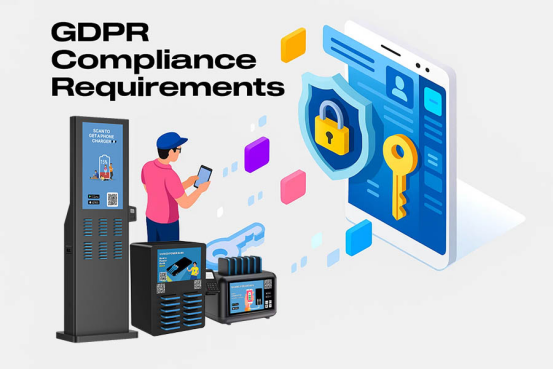With the globalization of the sharing economy, shared power banks have become one of the most representative business models and are rapidly expanding into the European Union (EU) market. However, the EU is well-known for its strict data protection regulations, especially the General Data Protection Regulation (GDPR), which sets a high standard for personal data processing.
For any shared power bank applications operating within the EU or targeting EU users, strict GDPR compliance is mandatory to ensure user data security and privacy while avoiding significant legal and financial risks.
1. Overview of GDPR and Its Importance
The GDPR came into effect on May 25, 2018, aiming to protect the privacy of EU citizens’ personal data, grant individuals greater control over their data, and impose strict obligations on data controllers and data processors.
The regulation applies to any organization that processes the personal data of EU residents, regardless of where the organization is based.
For shared power bank apps, this means:
If your service targets EU users, you must comply with GDPR, or face hefty fines — up to €20 million or 4% of the company’s global annual revenue, whichever is higher.
GDPR is built upon seven core principles that underpin all data processing activities:
- Lawfulness, Fairness & Transparency — Data must be processed on a clear legal basis and communicated to users in an understandable way.
- Purpose Limitation — Data must only be collected for specific, explicit, and legitimate purposes and not processed beyond those purposes.
- Data Minimization — Collect only the data necessary for the intended purpose.
- Accuracy — Keep personal data accurate and up-to-date, and correct or delete inaccuracies promptly.
- Storage Limitation — Retain personal data only as long as needed for the purpose collected.
- Integrity & Confidentiality — Implement technical and organizational measures to ensure data security.
- Accountability — The data controller (your company) must demonstrate compliance with all GDPR principles.
2. Types of Data Collected by Shared Power Bank Applications
Due to the nature of the business model, shared power bank apps function as data collection and processing platforms. To enable a simple rental transaction, the app typically collects:
- Identity Data — Name, email address, and phone number.
- Device Identifiers — IMEI, MAC address, and unique device IDs.
- Financial Data — Credit card information, PayPal account details, invoices, and transaction histories.
- Geolocation Data — Core to the service, including real-time GPS tracking when renting or returning a power bank, as well as station locations.
- Behavioral Data — Rental duration, late returns, power bank usage, and in-app activity logs.
Every stage of data processing — collection, storage, access, analysis, archiving, and deletion — falls under GDPR regulation, making compliance essential.
3. Key Data Processing Scenarios & GDPR Compliance Guidelines
Shared power bank apps handle sensitive data across multiple user interactions. Below are the critical compliance scenarios:
3.1 User Registration & Identity Verification
Data Collected:
Phone numbers, email addresses, payment details, and in some cases, ID verification (driver’s license or passport).
Compliance Requirements:
- Legal Basis: Usually based on “performance of contract” (to provide rental services) or “legitimate interests” (e.g., fraud prevention). For biometric data, explicit consent is required.
- Transparency: Clearly inform users before registration about:
- What data is collected and why
- How the data is used (e.g., phone for login, payment info for billing, location for station navigation)
- Who data is shared with (e.g., payment processors, cloud providers)
- Retention periods (e.g., delete 6 months after account closure)
- User rights under GDPR
- What data is collected and why
- Consent Management: For non-essential data processing (e.g., marketing emails), obtain freely given, specific, informed, and unambiguous consent. Pre-ticked boxes are invalid. Allow users to withdraw consent easily at any time.
3.2 Continuous Collection of Geolocation Data
Why It Matters:
Real-time geolocation is core functionality for shared power banks — users need to find nearby stations, and operators need to track device return locations.
Compliance Requirements:
- Prominent Notice: Clearly inform users about precise location data collection, especially when running in the background. Do not bury this information in long privacy policies.
- Explicit Consent: When requesting location permissions, specify the purpose:
“We use your GPS location only to help you find nearby charging stations.”
If denied, avoid repeatedly prompting the user or restricting access unless the location is absolutely essential. - Data Minimization: Avoid continuous tracking. Use on-demand geolocation only when users actively search for stations, and rely on approximate network-based location when possible.
3.3 Payment Data Processing
Why It’s Sensitive:
Financial data is considered high-risk under GDPR.
Compliance Requirements:
- PCI DSS Compliance: Follow the Payment Card Industry Data Security Standard in addition to GDPR.
- Minimize Handling: Use third-party payment gateways like Stripe, Adyen, or PayPal. Let them handle sensitive payment data directly to reduce your compliance burden and breach risks.
3.4 User Behavior Analytics & Marketing
Business Goal:
Apps analyze rental patterns, usage trends, and popular station locations to improve services.
Compliance Requirements:
- Anonymization vs. Pseudonymization:
- Anonymized data (completely stripped of personal identifiers) falls outside GDPR scope.
- Pseudonymized data (random IDs replacing names) is still personal data and must follow GDPR rules.
- Anonymized data (completely stripped of personal identifiers) falls outside GDPR scope.
- Legitimate Interest Assessment: If analytics are based on legitimate interests, conduct an assessment ensuring business goals do not override user rights.
- Opt-out Options: Always provide users with an easy way to disable analytics tracking or reject marketing activities.
4. GDPR Compliance Best Practices: STW as an Industry Leader
Among global shared power bank providers, STW stands out for its strict GDPR compliance and privacy-first approach:
- Transparent Privacy Policy: STW uses clear, simple language to explain what data is collected, how it’s processed, and what rights users have.
- Robust Data Security: Advanced encryption protects data in transit and at rest. Regular security audits detect and resolve potential vulnerabilities.
- User Control & Data Rights: Users can view, edit, or delete their personal information through an intuitive account dashboard, with 24/7 customer support for GDPR-related requests.
- Compliant Cross-Border Transfers: When data is transferred outside the EU, STW uses Standard Contractual Clauses (SCCs) and ensures equivalent protection levels in recipient countries.
By integrating privacy by design into its services, STW sets a gold standard for GDPR compliance in the shared power bank industry.
5. Conclusion
Operating a shared power bank app in the EU requires full compliance with GDPR to protect user data and avoid severe legal risks.
Companies in this space should treat data protection as a core competitive advantage. By building a secure, transparent, and user-controlled data ecosystem, shared power bank providers can earn trust from EU users and achieve sustainable business growth.









































































